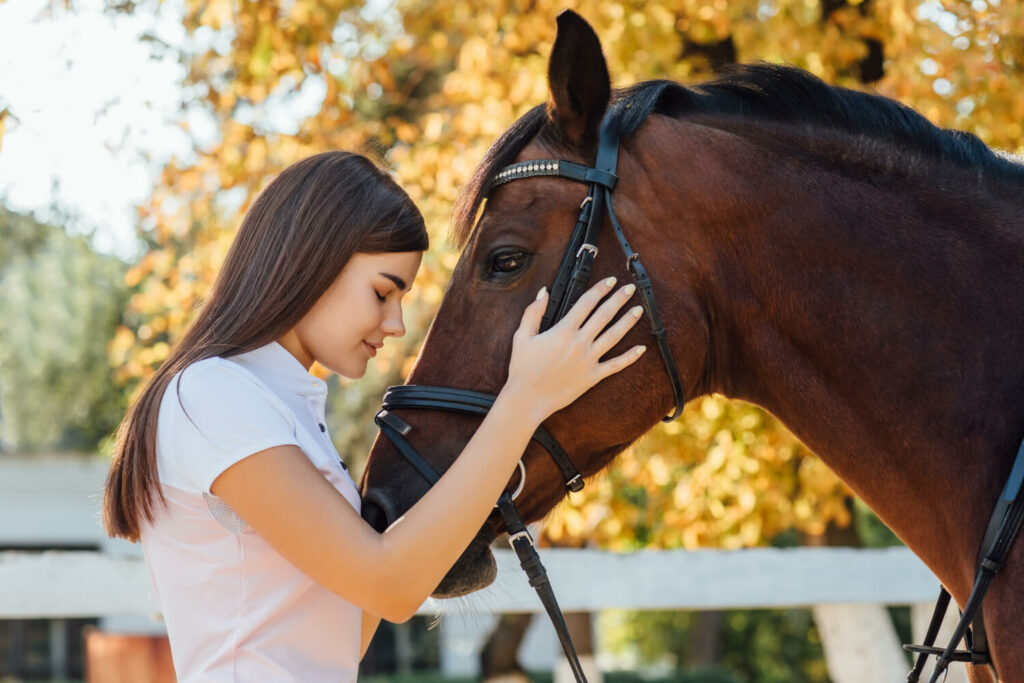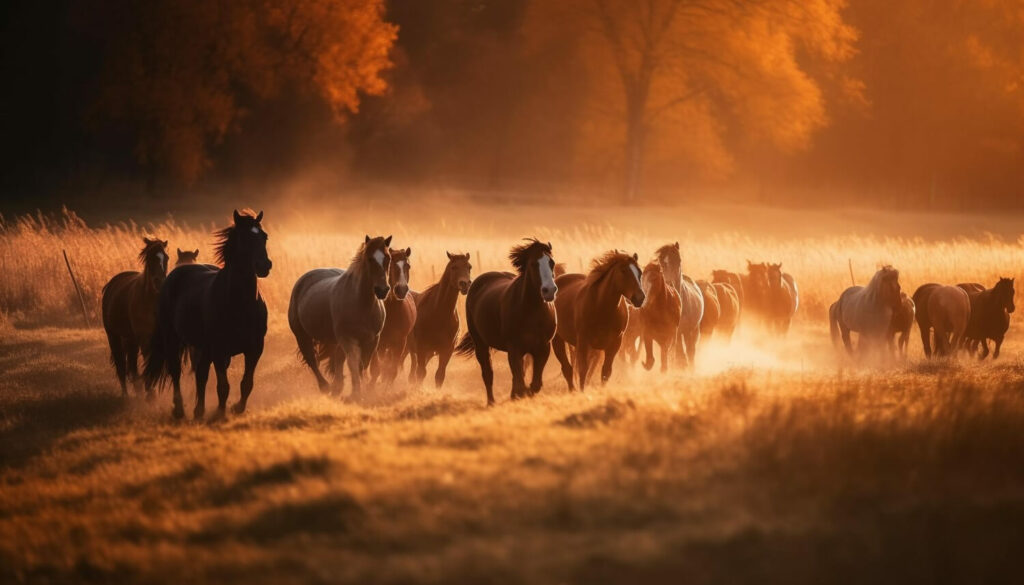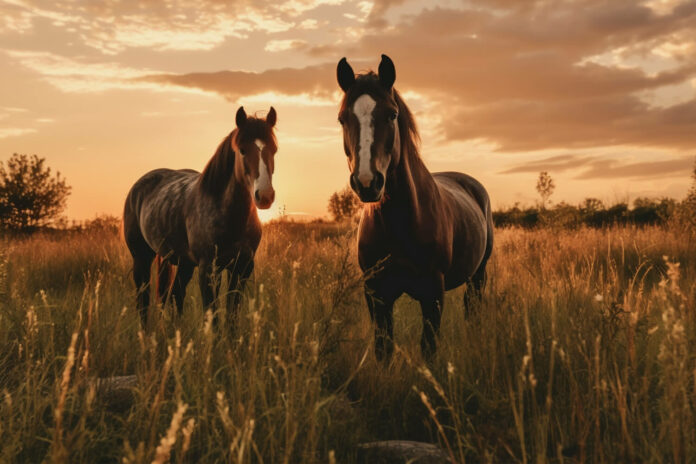Horses are magnificent creatures, and understanding their lifespans can help us care for them better.
If you own a horse, or you want to own a horse, you need to know that horses need a lot of attention and maintenance (like every animal) for a long time. They live a long life and can stay in your barn for at least 2 decades.
Let’s get onto how long do horses live so that you can decide if you’re the right person for having one.
The Average Lifespan of Horses
When people ask, “how long do horses live?” the answer can vary. On average, horses live between 25 to 30 years. However, this range can differ based on several factors such as breed, health care, and living conditions.
Factors Influencing Horse Lifespan
- Breed: Different breeds of horses have different lifespans. For example, ponies often live longer than larger horse breeds. A pony can live well into its 30s and even reach its 40s with good care. Larger breeds like the draft horses may have shorter lifespans, usually around 20 to 25 years.
- Care and Management: Just like humans, horses need proper care to live a long, healthy life. Regular veterinary check-ups, a balanced diet, and a safe living environment are crucial. Owners who are attentive to their horse’s needs can significantly influence how long their horses live.
- Health: Chronic health conditions and diseases can affect how long horses live. Conditions like colic, laminitis, and arthritis can impact their lifespan if not managed properly. Preventive care and early intervention can make a big difference.
- Workload and Exercise: Horses used for heavy work or competitive sports may have shorter lifespans due to the physical stress placed on their bodies. However, regular, moderate exercise is beneficial and can contribute to a longer, healthier life.
Exceptional Cases
While the average lifespan of horses is 25 to 30 years, there are exceptional cases where horses have lived much longer.
The oldest recorded horse, named Old Billy, lived to be 62 years old! Such cases are rare, but they show that with extraordinary care and a bit of luck, horses can live significantly longer than the average.
Horse Aging
As horses age, they go through changes similar to aging humans. It’s important to recognize these changes to provide the best care possible.
Signs of Aging in Horses
- Dental Changes: Older horses often have dental issues. Their teeth may wear down, making it difficult for them to chew food properly. Regular dental check-ups can help manage this problem.
- Weight Management: Aging horses may lose weight or have difficulty maintaining a healthy weight. Providing easily digestible feed and monitoring their diet can help.
- Mobility Issues: Arthritis and other joint problems are common in older horses. Ensuring they have a comfortable living space and providing joint supplements can improve their quality of life.
- Decreased Immunity: Older horses may have weaker immune systems, making them more susceptible to infections and diseases. Regular veterinary care and vaccinations are essential.
Caring for Older Horses
Caring for an older horse requires a bit more attention and effort. Here are some tips:
- Regular Vet Visits: Ensure your horse gets regular check-ups to catch any health issues early.
- Proper Nutrition: Feed your horse a diet suitable for its age, with the right balance of nutrients.
- Comfortable Living Conditions: Make sure your horse has a clean, dry, and comfortable place to live.
- Gentle Exercise: Keep your horse active with gentle exercise to maintain muscle tone and mobility.
Breeds and Their Lifespans
Different horse breeds have varying life expectancies, largely due to genetic factors, size, and historical uses of the breed.
Let’s take a look at these popular breeds:
- Arabians: Known for their endurance and strong build, Arabians can live up to 30 years or more. They are often considered one of the longest-living horse breeds.
- Thoroughbreds: These horses, famous for racing, generally have a lifespan of around 25 to 28 years. Their high-energy lifestyle and rigorous training can impact their longevity.
- Quarter Horses: Popular for their versatility and gentle nature, Quarter Horses often live between 25 to 30 years. With good care, many can surpass this range.
- Draft Horses: Breeds like the Clydesdale and Shire, known for their large size and strength, typically have shorter lifespans, around 20 to 25 years. Their larger body mass can contribute to earlier aging and health issues.
- Ponies: Ponies, such as the Shetland or Welsh Pony, generally outlive their larger counterparts. They can live into their late 30s and even into their 40s with proper care.
 Improving Lifespan Through Care
Improving Lifespan Through Care
To truly understand how long do horses live, it’s important to recognize the impact of good care and management practices.
Let’s take a look at some key aspects of horse care that can help extend their lives.
Nutrition and Diet
A balanced diet is fundamental to a horse’s health and longevity. Here are some dietary tips to help your horse live a longer, healthier life:
- Quality Forage: Ensure your horse has access to high-quality hay or pasture. Forage should make up the majority of their diet.
- Balanced Nutrition: Provide a balanced diet that includes essential vitamins and minerals. Supplements can be beneficial, especially for older horses.
- Hydration: Always provide fresh, clean water. Hydration is crucial for digestion and overall health.
- Special Diets for Seniors: Older horses may require specialized diets that are easier to digest and higher in certain nutrients.
Regular Veterinary Care
Routine veterinary care is crucial in detecting and addressing health issues early. Regular check-ups, vaccinations, and dental care can prevent many common problems and ensure your horse remains healthy.
- Vaccinations: Keep up with your horse’s vaccination schedule to protect them from infectious diseases.
- Dental Care: Regular dental check-ups and floating (filing down sharp edges on teeth) are essential for older horses.
- Parasite Control: Implement a deworming schedule based on veterinary advice to manage internal parasites.
Environment and Living Conditions
Providing a safe, comfortable living environment can significantly impact how long horses live. Consider the following:
- Shelter: Ensure your horse has access to a clean, dry shelter to protect them from extreme weather conditions.
- Clean Living Space: Regularly clean stalls and paddocks to prevent health issues related to poor hygiene.
- Social Interaction: Horses are social animals. Regular interaction with other horses can improve their mental well-being.
Exercise and Activity
Maintaining an appropriate level of activity is essential for a horse’s physical and mental health. Even older horses benefit from regular, gentle exercise.
- Regular Exercise: Encourage daily exercise to keep your horse’s muscles and joints healthy. This can be through riding, groundwork, or turnout in a pasture.
- Adapted Workloads: Adjust the intensity of exercise as your horse ages. Reduce strenuous activities but keep them moving to prevent stiffness and muscle loss.
Special Care for Older Horses
As horses age, their needs change, and understanding these changes can help ensure they live comfortably and happily.
Common Health Issues in Older Horses
Older horses are more susceptible to certain health problems. Recognizing and addressing these issues early can improve their quality of life and longevity.
- Arthritis: This is a common condition in older horses, leading to joint pain and stiffness. Regular, gentle exercise and joint supplements can help manage arthritis.
- Dental Problems: As horses age, their teeth wear down, which can cause difficulty eating. Regular dental check-ups and adjustments are essential.
- Weight Management: Older horses may struggle with maintaining a healthy weight. Monitoring their diet and providing easily digestible, nutrient-rich feed can help.
- Decreased Immune Function: Aging can weaken a horse’s immune system, making them more prone to infections. Ensuring they receive appropriate vaccinations and veterinary care is crucial.
Tips for Caring for Older Horses
- Routine Vet Visits: Regular veterinary check-ups are vital for early detection of health issues. Schedule bi-annual or quarterly visits as your horse ages.
- Specialized Diet: Adjust your horse’s diet to meet their changing nutritional needs. Senior feeds are formulated to be easily digestible and provide necessary nutrients.
- Comfortable Living Conditions: Ensure your horse has a clean, dry, and comfortable place to rest. Soft bedding and easy access to food and water are important.
- Gentle Exercise: While older horses may not be able to handle intense exercise, regular, gentle activity helps maintain muscle tone and joint health. Consider light riding, hand-walking, or turnout in a safe pasture.
Emotional and Social Well-being
The emotional and social well-being of older horses is just as important as their physical health. Horses are social animals and thrive on interaction with their herd and humans.
- Companionship: Ensure your horse has companions, whether other horses or animals, to interact with. Social isolation can lead to stress and depression.
- Mental Stimulation: Keep your horse mentally engaged with activities and gentle training exercises. This can help prevent boredom and anxiety.
- Human Interaction: Spend time with your horse through grooming, petting, and talking to them. Building a strong bond can improve their overall well-being.

Stories of Long-Lived Horses
Horses that live exceptionally long lives often capture our imagination and hearts. Here are a few remarkable stories of horses that have lived well beyond the average lifespan.
Old Billy
Old Billy is often cited as the oldest horse ever recorded. Born in 1760 in England, this barge horse lived to an astonishing age of 62. His long life was attributed to a combination of genetics, a balanced workload, and good care.
Sugar Puff
Sugar Puff, a pony from the UK, lived to the ripe old age of 56. Sugar Puff’s owners credited his longevity to a diet of high-quality hay and a calm, loving environment.
Orchid
Orchid, a Thoroughbred-Arabian cross, lived to be 50 years old. Her owner emphasized the importance of regular veterinary care, a balanced diet, and a stress-free lifestyle in achieving her impressive age.
Frequently Asked Questions About Horse Lifespans
What is the Average Lifespan of a Horse?
The average lifespan of a horse is between 25 to 30 years. However, this can vary based on factors such as breed, care, and overall health. Some horses can live well into their 30s and even 40s with proper care.
Do Ponies Live Longer Than Horses?
Yes, ponies generally live longer than larger horse breeds. Ponies can live into their late 30s and even 40s. Their smaller size and often hardy nature contribute to their longer lifespans.
What Factors Influence How Long Horses Live?
Several factors influence how long horses live, including:
- Breed: Different breeds have different life expectancies.
- Care and Management: Regular veterinary care, proper nutrition, and a safe living environment are crucial.
- Health: Chronic conditions and diseases can impact lifespan.
- Workload and Exercise: Appropriate exercise and workload can contribute to a longer, healthier life.
How Can I Help My Horse Live a Long, Healthy Life?
To help your horse live a long and healthy life, follow these tips:
- Provide a Balanced Diet: Ensure your horse has access to high-quality forage and a balanced diet tailored to their needs.
- Regular Veterinary Care: Schedule routine check-ups, vaccinations, and dental care.
- Maintain a Safe Environment: Provide a clean, comfortable living space with adequate shelter.
- Exercise and Activity: Keep your horse active with regular, gentle exercise.
- Emotional and Social Well-being: Ensure your horse has social interaction and mental stimulation.
What Are Common Health Issues in Older Horses?
Common health issues in older horses include:
- Arthritis: Joint pain and stiffness.
- Dental Problems: Worn or missing teeth that affect eating.
- Weight Management: Difficulty maintaining a healthy weight.
- Decreased Immune Function: Increased susceptibility to infections.
Can Horses Live Beyond 30 Years?
Yes, many horses can live beyond 30 years with proper care. Exceptional cases, such as Old Billy who lived to 62, highlight the potential for horses to live much longer with good genetics and excellent care.




